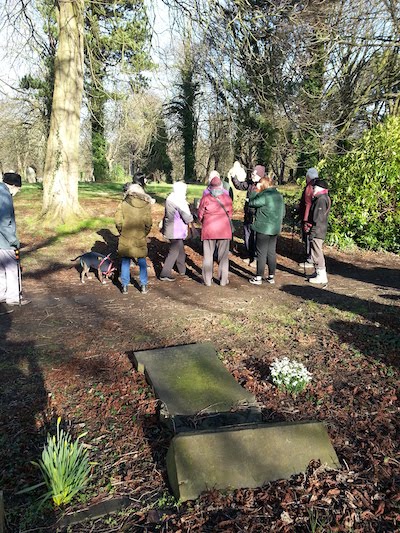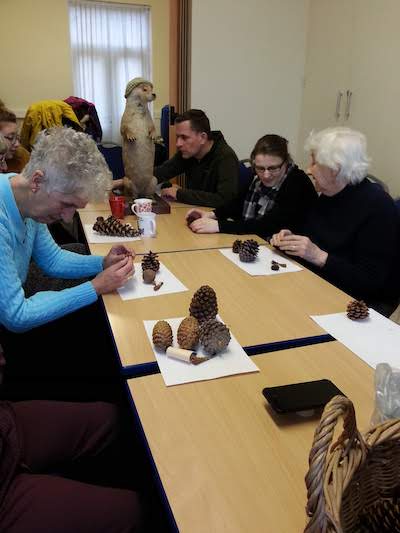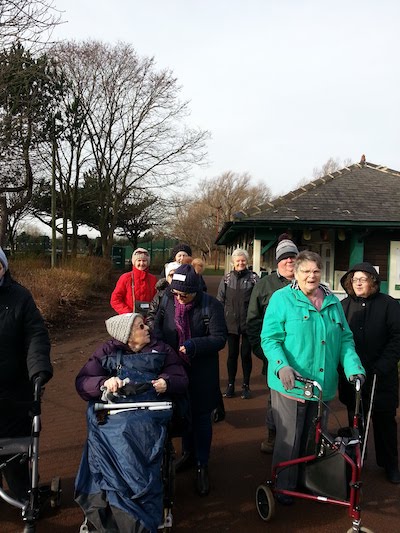Sensing the Wild- connecting visually impaired people to nature
Funded by the National Lottery Heritage Fund, our project has provided groups of Blind and visually- impaired people across the Tees Valley Region with workshops and walks to enable them to experience wildlife and nature across the four seasons. To do this effectively we needed to offer them a guided walk and some one- to- one support, and we have been fortunate to be able to work with the Friends Groups linked to local parks and woodlands, to whom we offered Sighted Guide training in how to make the wild spaces more accessible and how to assist a blind person.
About the project and its legacy
In August 2021 we finally came to the end of our project which was originally due to finish in November 2020! Due to the Covid-19 pandemic it had been delayed twice and there were times when we thought it might be impossible to gather our Blind and visually impaired participants together again as they had become very isolated and had lost a lot of confidence about coming into a social situation. However there was at last a window of opportunity in August and the final 4 workshops and walks were successfully arranged with our delivery partners the Tees Valley Wildlife Trust. The legacy from the project is significant. We carried out an IT audit of our participants – we learnt how limited their access is to methods of communication. Some have no internet connection at all or are not able to use computers. The landline is the main link plus mobile phones for others. We have learned a lot about the use of sounds to evoke memories of places which will inform our work in the future on Soundscapes designed specifically to be accessible for people with sight loss, an exciting development for us. As GFI is a National company, we are looking at the potential for sharing our methods and running a pilot guided walk at the Barnes Wetland Centre in Richmond organised by one of our Directors who lives in the area. Using conference calling: People isolated from meeting up in our groups have been desperately lonely during the lockdowns. We were communicating with them using landline phones and conference calls to enable them to speak to us and to each other. We know how much they want to be able to get back with their peer groups, although having lost over a year of time some have lost their confidence and are fearful of coming out. An additional outcome from our project was that in Hartlepool more walks were organised by a local group leader which were supported by our team at GFI as staff volunteers, and we provided refreshments – out of our reserves. Covid investment for future activities Over the last year we have invested in hand sanitisers, masks and surface cleansers and our plans for the next project include using bigger venues for workshops where people can keep their distance safely. We have purchased ramble-tags to use on our walks so that blind people can walk safely behind a sighted guide keeping their distance appropriately, and we now have a megaphone for the walk leader to use to communicate to a widely spaced audience more effectively, recognising that some may also have some hearing loss. Making new friends We provided Sighted Guider training for the Friends groups at the parks and woods we walked in – giving them an insight into how to support and assist people with sight loss to negotiate the natural environment and get the most out of their walks and sensory experiences. Links that endure have been made between participants in the walks at all of our venues and in particular at Linthorpe Cemetery, Middlesbrough and South Park, Darlington. Linthorpe Cemetery The Friends group here have embraced the workshops and walks and as their members are a mixture of older and elderly people, some with their own Long Term Conditions; working together has been a great joint exercise with improved wellbeing, lots of smiles and enjoyment all round. The social side has been important for our visually impaired groups as well as the Friends and being able to factor in good nutritional lunches has helped to reinforce the bonds created by keeping people together for longer in a social setting. Linthorpe Cemetery is steeped in local history and going forward our organisation plans to work with the Friends to do some nature field recordings and history interviews to create a soundscape which captures the essence of this fascinating location. This soundscape will capture the memory of our walks for our groups and others with links to the cemetery, especially for people who are not able to visit it easily. Darlington South Park This is a particularly beautiful park with a very active Friends group which has supported our project from the start. Through this group we made contact with Fal Sarker, a keen botanist and member of the Botanical Society of Britain and Ireland, who made a presentation to their conference in 2020 about our project and the importance of making nature more accessible. This has resulted in further developments including making a Sensory Garden at South Park and GFI is planning to work with them on a further project planned for next year which will include making a soundscape recording for the park. Health and wellbeing Over this last 8 months coping with the Covid-19 pandemic has meant that our memories of the walks and workshops has given participants and Friends plus our other volunteers and our own GFI staff members wonderful memories to cherish. Our walks out of doors in safe company have improved our mental health and wellbeing. In early 2020 GFI and three of our participants from Darlington Social Club for the Blind and visually Impaired (which included 2 guide dogs) did a presentation for staff of the Heritage Lottery on our project and the impact it was having to which we received good feedback. We feel sure this will have given food for thought to those hearing it.
Photos from the project

A Spring walk in Linthorpe Cemetery

A workshop in Darlington

A walk in Locke Park, Redcar
